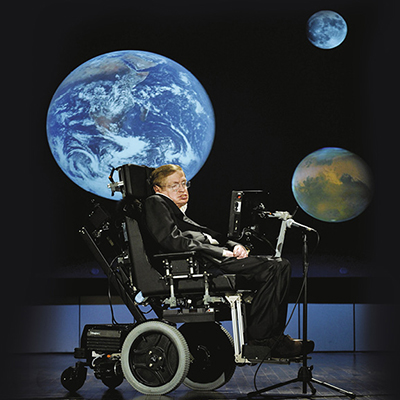



  




 



 
|
| 25. 03. 2018 ISSUE 7 | |||
|
|
Foreword |
|||
|
Dear students, Easter break is just round the corner. This year, it will come along with the first-ever University Reading Week. Are you going to utilise this period to do some revision for your final exams? Or you will really pick a book to read? If the latter, you could have a broad choice but A Brief History of Time written by Stephen Hawking is believed most seasonable. You may have come across it when you were in secondary school. I wish it would take on a new meaning to you - that is "hope". Hawking, who was considered the brightest star in the firmament of science of his time, died aged 76 on 14 March 2018 at his home in Cambridge. Suffering from amyotrophic lateral sclerosis, Hawking was confined to an electric wheelchair and aided by a voice synthesiser for much of his adulthood. Although the illness paralysed Hawking's body, it did nothing to curb his contribution to theoretical physics and cosmology. He once said, "I cannot move and I have to speak through a computer, yet I am free in my mind." Like many others, I am particularly impressed by his passion for life. His message to us about dealing with hardship was - where there is life, there is "hope". Two days before the decease of Hawking, I watched the film The Shawshank Redemption screened by I·CARE Theatre. Adapted from Stephen King's novella of 1982, this film is a tale featuring freedom and survival. One of the commentaries suggested, "The Shawshank Redemption provides a great illustration of how characters can be free, even in prison, or unfree, even in freedom, based on their outlooks on life." I, together with quite a number of audiences at the Sir Run Run Shaw Hall that evening, was deeply moved by its theme - "hope". "Hope" helps keep people alive and set them free. "Hope" promises a destination where things will be better, even if we are seemed to be in perpetual turmoil or mishaps. Many of us today are aware of the significance of "hope", but few know how to develop it. I am eager to share with you that the I·CARE Centre for Whole-person Development is committed to holding hands with you to explore and attain this good quality, among other values, through a wide spectrum of activities and services. Sincerely yours, Irene Ng |
|
||
|
|
|||
|
Past Issue
| |
|
|
|
|
|
